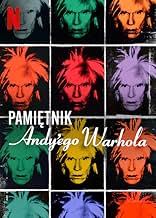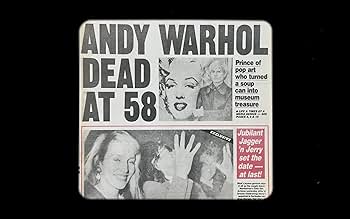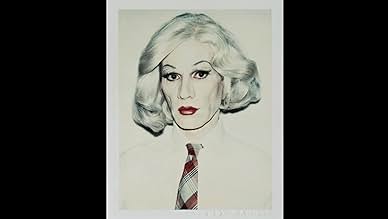PUNTUACIÓN EN IMDb
7,7/10
2,8 mil
TU PUNTUACIÓN
Tras ser disparado en 1968, Andy Warhol empieza a documentar su vida y sentimientos. Esos diarios, y esta serie, revelan los secretos del hombre más allá del personaje.Tras ser disparado en 1968, Andy Warhol empieza a documentar su vida y sentimientos. Esos diarios, y esta serie, revelan los secretos del hombre más allá del personaje.Tras ser disparado en 1968, Andy Warhol empieza a documentar su vida y sentimientos. Esos diarios, y esta serie, revelan los secretos del hombre más allá del personaje.
- Nominado para 4 premios Primetime Emmy
- 2 premios y 9 nominaciones en total
Explorar episodios
Argumento
¿Sabías que...?
- CuriosidadesA voice cloning technology called "Resemble AI" was used to recreate Andy Warhol's voice. Director Andrew Rossi explained that it stemmed from Warhol's desire to be emotionless like a machine.
Reseña destacada
A class act on all fronts.
First of all, from the credits on in, it looks sumptuous. The use of digital technology is far more aesthetically sophisticated than pretty much anything I'm seeing from Hollywood and shows, like only one or two other films I'm aware of (the neo Giallo 'Amer' is one) that digital at its best can make a vital, valuable contribution to movie imagery. We even get a sort of implicit origin story for all this in a couple of clips of Warhol trying early computer drawing programmes, once with instruction from Steve Jobs. The leap from that to this doc is something like that from kid's drawing to the high Renaissance. Here, the tech is used to seamlessly weave together an extraordinarily rich array of filmed source material available on Warhol with modern-day interviews and give the whole a lushness at least equal to that of film.
The digital finishing touch: with the permission of the Andy Warhol Foundation, Warhol's voice has been computer simulated to read the diaries - and just as the computerised imagery achieves warmth, the voice, the seeming summa of Warhol's stated desire to become a machine, has a surprisingly human quality, its hint of melancholy entirely right for the diaries.
This little irony of Warhol finally becoming a machine but the machine achieving feeling is almost a metaphor for the story being told here, for the likely discovery of what being a machine meant to Warhol as a man. In an almost aggressively gleeful flouting of Barthes' 'Death of the Author,' the doc is primarily about Warhol's personal life, especially his long-term love relationships with men. Excellent as Barthes' argument is in many ways, we might note at this point that he was himself a gay man in a homophobic time, who may have had his own reasons for wanting to keep the author's biography in the shadows.
This is the question being asked here: how much was Warhol's brilliantly constructed artistic persona - machinelike, detached, asexual - born of a need to hide or at least make palatable his homosexuality? As discussed here, this is not a reductive question. It more than allows for the fact that, as all art is artifice, the need to veil certain messages can actually enrich the work, and also for Warhol's work still to be read through other lenses. Nevertheless, given the way the persona played itself out in the work, I think the series makes an incredibly strong argument that this is a question, and an area of his biography, that Warhol scholarship cannot ignore, that the personal likely mattered to the work even in terms of the way it was hidden by the work.
Fortunately, for the filmmakers and the viewers, it also, by its nature, makes for a fascinating, touching human story.
First of all, from the credits on in, it looks sumptuous. The use of digital technology is far more aesthetically sophisticated than pretty much anything I'm seeing from Hollywood and shows, like only one or two other films I'm aware of (the neo Giallo 'Amer' is one) that digital at its best can make a vital, valuable contribution to movie imagery. We even get a sort of implicit origin story for all this in a couple of clips of Warhol trying early computer drawing programmes, once with instruction from Steve Jobs. The leap from that to this doc is something like that from kid's drawing to the high Renaissance. Here, the tech is used to seamlessly weave together an extraordinarily rich array of filmed source material available on Warhol with modern-day interviews and give the whole a lushness at least equal to that of film.
The digital finishing touch: with the permission of the Andy Warhol Foundation, Warhol's voice has been computer simulated to read the diaries - and just as the computerised imagery achieves warmth, the voice, the seeming summa of Warhol's stated desire to become a machine, has a surprisingly human quality, its hint of melancholy entirely right for the diaries.
This little irony of Warhol finally becoming a machine but the machine achieving feeling is almost a metaphor for the story being told here, for the likely discovery of what being a machine meant to Warhol as a man. In an almost aggressively gleeful flouting of Barthes' 'Death of the Author,' the doc is primarily about Warhol's personal life, especially his long-term love relationships with men. Excellent as Barthes' argument is in many ways, we might note at this point that he was himself a gay man in a homophobic time, who may have had his own reasons for wanting to keep the author's biography in the shadows.
This is the question being asked here: how much was Warhol's brilliantly constructed artistic persona - machinelike, detached, asexual - born of a need to hide or at least make palatable his homosexuality? As discussed here, this is not a reductive question. It more than allows for the fact that, as all art is artifice, the need to veil certain messages can actually enrich the work, and also for Warhol's work still to be read through other lenses. Nevertheless, given the way the persona played itself out in the work, I think the series makes an incredibly strong argument that this is a question, and an area of his biography, that Warhol scholarship cannot ignore, that the personal likely mattered to the work even in terms of the way it was hidden by the work.
Fortunately, for the filmmakers and the viewers, it also, by its nature, makes for a fascinating, touching human story.
- johnpmoseley
- 18 mar 2022
- Enlace permanente
Selecciones populares
Inicia sesión para calificar y añadir a tu lista para recibir recomendaciones personalizadas
- How many seasons does The Andy Warhol Diaries have?Con tecnología de Alexa
Detalles
- Fecha de lanzamiento
- País de origen
- Sitios oficiales
- Idioma
- Títulos en diferentes países
- The Andy Warhol Diaries
- Ver más compañías en los créditos en IMDbPro
- Duración1 hora
- Mezcla de sonido
- Relación de aspecto
- 16:9 HD
Contribuir a esta página
Sugerir un cambio o añadir el contenido que falta







































